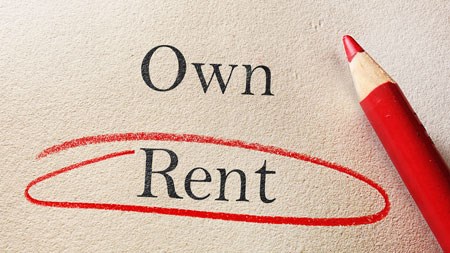Renting an apartment when you are a student has many cost implications. This article offers some guidance about your financial obligations as a tenant, as well as your landlord's responsibilities.
As a student, you have plenty of expenses – tuition, textbooks and of course, entertainment. Moving into your own apartment for the duration of your studies is exciting, but it can also end up being more expensive than you realise if you don’t factor in all the associated costs before signing your lease agreement.
The last thing you want is an unexpected bill at the end of the month for any additional expenses. Pam Golding Properties area manager for Stellenbosch, Louise Varga, advises you to discuss all possible costs before you and your parents finalise your lease, so that there are no unexpected bills at the end of the month, or when you move out. An ingoing inspection and inventory of fittings in the flat will be done by the landlord, or by the rental agent, when you move in. Take note of the fittings listed in the inspection report and discuss any concerns with your landlord or agent before you take occupation of the apartment. This will ensure that you as the new tenant (lessee) will not be liable for anything that is not of your doing, at the end of your lease, says Welmarie Botes, Pam Golding Properties rental manager for Grahamstown.
Your lease agreement should also stipulate your contribution to the apartment’s utility costs. This means that you will be billed for water, electricity (unless there is a prepaid metre), sewage costs and refuse removal. The first thing you need to be sure of is your monthly rent and the deposit required to secure your apartment. The amount of this deposit may vary from one to three months’ rent and must be paid into an interest-bearing bank account, says Suzette Kruger, Pam Golding Properties agent for Stellenbosch. This money will enable the landlord to pay for damages incurred during your lease period. If you stay longer than a year in your apartment, you may also have to factor in a rental increase that can vary between five and 10%. Remember that an extension on a lease contract, accompanied by a rental increase, will also result in an increase in the deposit, says Kruger. Other upfront costs may include a key deposit, remotes and access cards as well as an administrative fee if you are renting through a rental agent.
Your landlord is responsible for any indirect operating costs including levies and any fees charged by the Body Corporate or Homeowners’ Association, if you are living in a sectional title complex or an estate. It is the landlord’s responsibility to offer you a property that is reasonably fit for the purpose it has been let, explains Varga. This means he or she will make sure that there are no broken pipes or damage that could put you at risk for injury, or an infestation of cockroaches and other pests. Kruger explains that the landlord is usually responsible for pest control for up to six weeks after occupation. Thereafter, if you find that a new pest problem arises at any stage during your lease period, you will have to pay for the fumigation of the property.
As a student, you need access to the Internet with fast Wi-Fi. Chat to your landlord about phone line rental and internet access. Some of these services may already be provided and paid for by your landlord. Your landlord may include broadband in the price of your rent, in which case you would not have to take out your own subscription. Many apartments do have fibre connectivity.
If you are in an property with a communal swimming pool, the maintenance costs will be covered by the levies your landlord pays to the Body Corporate, or the Homeowners’ Association if you are in an estate. If you are renting a house that has a pool, make sure your lease agreement stipulates maintenance responsibilities. The condition of the pool from part of the inspection report. Pay special attention to the condition of the pool pump and other accessories when you move in. Chat to your landlord about a service provider who you both agree would help keep the pool in its current state. Your lease should outline your respective maintenance obligations to avoid potential conflict later, says Botes.
The same goes for the maintenance of any gardens or lawns, especially in areas where water is scarce. While the tenant is responsible for the upkeep of the garden, and for complying with any water restrictions and by-laws that may be in place, the landlord must understand that this may affect aspects of the garden’s condition. You will still have to do other maintenance, such as weeding and mowing the lawn, as needed.
The owner of your apartment should also put in reasonable security measures, but any additions – such as a security gate or extra beams – may be for your account. You would also need to get your landlord’s approval before you install these. You will also have to pay the contract for armed response. On that note, if there is a burglary and there is any damage to the structure of the apartment, the landlord would have to pay the repair costs, says Kruger. If there is a burglary or even a fire in your apartment, you will have to pay for the loss of any personal items that are stolen as the insurance of the contents of your apartment is your responsibility.
Your landlord is responsible for maintaining the structure of the property, but you will have to make sure that the apartment remains in good condition. This means that you obligated to do basic maintenance, such as the replacement of bulbs and tap washers, and cleaning of drains. Bear in mind that the Rental Act enables your landlord to claim compensation from you if there is any damage to the property, that does not include fair wear and tear. So, for example, if a carpet is worn out from everyday use, it would be considered fair wear and tear. But a carpet that has not been properly cleaned, and would not otherwise have worn through, will need to be replaced at your expense, says Varga. Your landlord may deduct these repairs, as well as any cleaning costs incurred from your deposit, if your apartment is not in a satisfactory state when you move out, says Kruger.
So, be sure to consider all possible hidden and future costs when discussing your lease agreement. This means that, when it is time for you to move, and your lease has come to an end, you will be able to move on to your next home with ease, and with more cash in your pocket.





